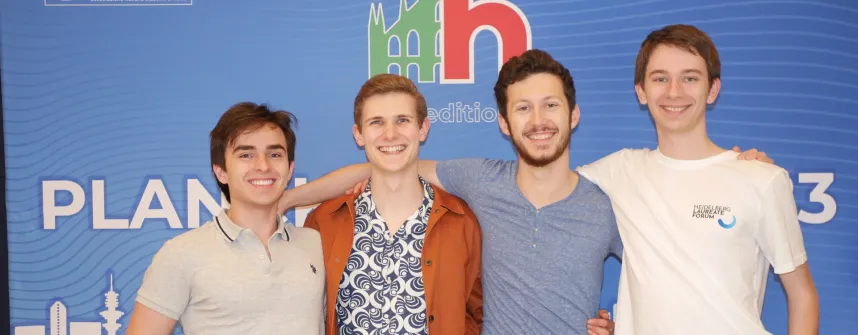Constructor University team takes bronze at international physics olympiad for university students
The competition was fierce, the tasks challenging: At the international physics competition "PLANCKS" in Milan, a quartet from Constructor University secured third place. The competition, which is referred to as the international Physics Olympics for students, took place from May 12th to 16th and attracted 50 teams from 30 countries.
Representing the colors of Constructor University were students Dmytro Kolisnyk (BSc 2023), Sebastian Nicolas (BSc 2023), alumnus Marco David (BSc 2020), and external student Quentin Lamouret (École Normale Supérieure, Paris). The quartet competed under the name "The Absolute Zeros" - a reference to the lowest possible temperature in nature and their own “coolness”.
However, PLANCKS did not take a cool approach, quite the opposite. Within a few hours, the teams from all over the world had to solve a series of complex tasks. "The standard was extremely high. It met the requirements that are also placed on research," said Dr. Peter Schupp, Professor of Physics at Constructor University in Bremen. "Working with such excellent students is a pleasure. Congratulations to the team," said Schupp, with whom three of the "Absolute Zeros" did research on topics in quantum and gravitational physics for their bachelor's theses.
For the students, participating in the multi-day competition, which takes place in a different country every year, was not only an honor but also a great opportunity to network and learn about the latest trends in physics. "The people, the cultural program, the organization - it was an all-around fantastic event," said Dmytro Kolisnyk. "The tasks were really hard, but thanks to our studies we were well prepared," added Sebastian Nicolas.
The Physics and Data Science program at Constructor University has a long list of successes in national and international competitions. This year, "The Absolute Zeros" already placed 2nd in the DOPPLERS physics competition, the national physics olympiad. In addition to Constructor University, teams from Germany represented at PLANCKS included teams from LMU Munich, TU Munich and TU Berlin. Gold and silver went to teams from Italy, while fourth and fifth place went to teams from France and Germany.
Questions answered by:
Dr. Peter Schupp | Professor of Physics
pschupp@constructor.university | Tel.: +49 421 200-3224
Past successes:
http://physics.user.jacobs-university.de/jacobs-students-win-international-university-physics-competition/
/news/gold-jacobs-university-students-win-international-physics-competition
About Constructor University:
An international community, vibrant and diverse. Offering academic excellence, ensuring the highest standards in research and teaching. Empowering students to solve the world's pressing challenges through knowledge and science: Constructor University is a top-ranked, English-speaking, private university. Founded in 2001, it provides a wide range of 25+ academic programs and PhD. The Constructor ecosystem comprises the University, located in Bremen, Germany, and an institute in Schaffhausen, Switzerland.
Over 1.800 students from more than 110 nations on campus benefit from a unique interdisciplinary, foundational theoretical and practical education. Enriched with a buzzing entrepreneurial culture that prepares young professionals to thrive in the job market. With 6.000+ alumni worldwide, our community keeps growing – with our highest cohort ever registered in 2022.
The research-centric faculty projects are funded by the German Research Foundation and the European Union's Framework Program for Research and Innovation as well as by globally leading companies.
The Constructor ecosystem benefits from partnerships with high-ranked universities such as Carnegie Mellon, the University of Geneva or the National University of Singapore School of Computing, and technology companies such as Anisoprint, JetBrains and ChemDiv.
Constructor is a global institution dedicated to addressing the main challenges of the world through science, education, and technology. Apart from the University in Bremen, the ecosystem comprises an Institute in Schaffhausen (Switzerland) and several for-profit entities that provide technology infrastructures and solutions, life-long education programs, consulting services, and funding.
